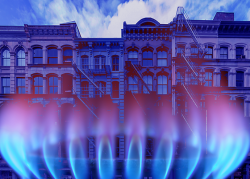Elected officials are pushing to ban fossil fuel hookups in new buildings by the end of the year, which real estate and construction professionals argue is too hasty.
The bill would prohibit the use of gas and oil in new construction as well as in “major renovation” projects within just two years of its passage. The de Blasio administration supports the measure, though not necessarily its timeline.
At a City Council Committee on Environmental Protection hearing, Ben Furnas, director of the Mayor’s Office of Climate and Sustainability, said the administration is seeking an “aggressive but achievable” implementation of the ban. The mayor has previously called for a prohibition on gas hookups by 2030.
Furnas said the administration supports passing a version of the measure before de Blasio’s term ends Dec. 31.
The Real Estate Board of New York supports the gradual electrification of the city’s building stock, but argues that the proposed rollout would prove too costly and would rely on dirty electricity.
The state has mandated that at least 70 percent of New York’s electricity come from renewable sources by 2030, and 100 percent by 2040, but there is no guarantee that those goals are met. According to the U.S. Energy Information Administration, only 28 percent of New York’s electricity was derived from renewables last year.
Read more


REBNY supports phasing in the ban, to coincide with the completion of offshore wind and other large-scale renewable transmission projects. The group suggests first applying it to construction of fewer than three stories and single-family homes in 2025, then to new buildings with fewer than 10 stories in 2027, followed by all taller projects by 2030.
“This would help to avoid buildings utilizing inefficient electric systems that would quickly overburden the electric grid,” the group wrote in prepared testimony. REBNY also said electric heat pumps have not been adequately tested in large-scale buildings, and that giving the industry more time would pave the way for ensuring this and other technology can be used widely.
The New York Building and Construction Trades Council also testified against the measure, citing similar concerns that lots of new electric-heat buildings would overwhelm the city’s power grid. And the Partnership for New York City noted, “Many large new developments that will seek building permits in two years are already far along in design, planning and land use approvals.”
Some environmentalists, however, want the measure accelerated, not delayed.
Peter Sikora, who leads New York Communities for Change’s climate and inequality campaign, called for shortening the implementation to one year, and for defining “major renovations” as all type one alterations, or those that require a new or amended certificate of occupancy.
“New York City faces an existential threat, and there is no time to delay,” he said at Wednesday’s hearing, referring to climate change. At one point, he held up a sheet of paper with “bullshit” scrawled on it as a critic of the bill spoke.
The measure’s sponsor, Brooklyn Council member Alicka Ampry-Samuel, emphasized the need to cut down on dangerous pollutants, noting that related health issues are disproportionately high in communities that are often left out of climate change initiatives.
A study published in Science Advances found that people of color are disproportionately exposed to harmful air pollution, with residential gas combustion and commercial cooking being among the largest sources.
Assembly member Emily Gallagher, who represents northern Brooklyn, said she planned to push for a statewide version of the measure once the city approved the bill.
Nearly 40 percent of the city’s greenhouse gas emissions can be attributed to heating air and water in buildings, according to RMI, a clean-energy nonprofit. Two years ago, Berkeley, California, became the first city in the country to ban natural-gas hookups in most new construction. Other cities have followed suit. But other states, including Arizona and Texas, have barred municipalities from enacting similar bans.
New York City’s bill aligns with other deadlines dreaded by the real estate industry. Under Local Law 97, buildings larger than 25,000 square feet must meet new greenhouse gas emission caps starting in 2024 and even stricter limits by 2030.
Urban Green Council’s Chris Halfnight also suggested a phased-in approach to the gas ban. He and others raised concerns that the measure could encourage the use of blended fuels, such as a mixture of natural gas and hydrogen, to meet the bill’s requirements.
In targeted buildings, the measure would forbid the combustion of any substance that emits 50 kilograms or more of carbon dioxide per million British thermal units of energy. According to the U.S. Energy Information Administration, natural gas clocks in at more than 53 kilograms and heating oil at more than 70. A blended fuel could be used to get under the threshold without switching to electric heat.
Some developers have voiced support for the bill. Alloy Development has held up its under-construction 440-unit building at 100 Flatbush as proof that an all-electric tower is possible.
“Installing a natural gas system in a new building today is a bit like installing a landline telephone a decade ago. The technology is approaching the end of its useful life,” AJ Pires, the president of Alloy Development said in prepared testimony. “The future will not and cannot rely on burning natural gas to heat our homes and cook our food.”
